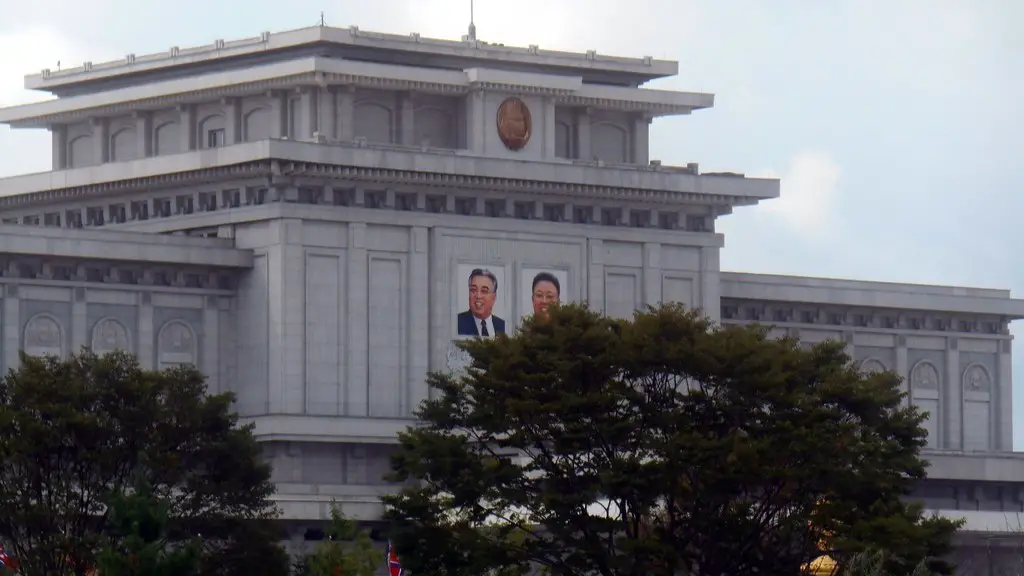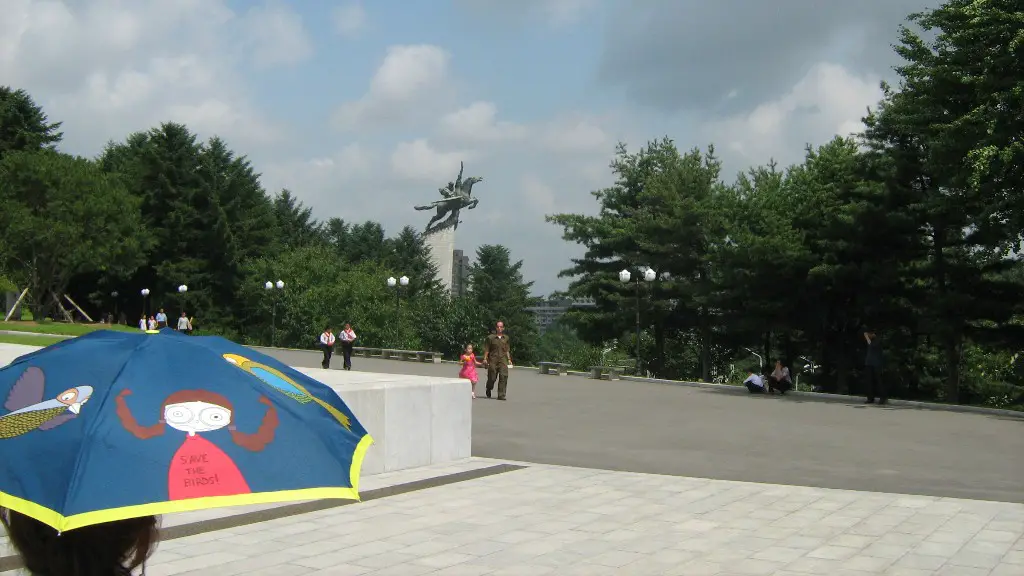With tensions between the United States and North Korea at an all-time high, it is important to discuss why this tension has grown. An underlying factor of this tension is North Korea’s nuclear weapons program, which began in the 1980s with assistance from the Soviet Union. This program has continued to serve as a source of tension between North Korea and the US as North Korea continues to pursue nuclear weapons and has refused to abandon its nuclear program. North Korea’s pursuit of nuclear weapons has been met with strong sanctions from the United Nations and the US, as well as international pressure.
The US has expressed serious concern about North Korea’s ballistic missile and nuclear weapons programs, which have both been a threat to regional stability in Asia and the world. In order to curb North Korea’s nuclear ambitions, the US has deployed the Terminal High Altitude Area Defense (THAAD) system in South Korea and Japan. This system is designed to intercept missiles launched from North Korea and intercept them before they reach their target. Despite these efforts, North Korea has continued to test its nuclear weapons, and has often threatened the US with military action if the US does not stop its efforts to contain North Korea’s nuclear program.
Experts believe that the US and North Korea will not be able to reach a diplomatic solution anytime soon as long as North Korea maintains its nuclear program and refuses to comply with international sanctions. This has led to increased economic sanctions, a policy of “maximum pressure” from the US and international allies, and a more comprehensive package of diplomatic and economic measures from China, South Korea, and Japan.
The US also intends to keep up the pressure on North Korea in order to force the regime to abandon its nuclear weapons program. While North Korea has expressed a willingness to talk and has engaged in negotiations with South Korea, the US has refused to negotiate without North Korea first pledging to denuclearize. As a result, the US has been reluctant to pursue a diplomatic solution, instead choosing to continue with sanctions and other pressure tactics.
Though it is difficult to predict how the current situation between the US and North Korea will develop, tensions remain high and there is no clear resolution in sight. As long as North Korea refuses to surrender its nuclear weapons program, it is unlikely that the US or any other country will be able to effectively contain the threat it poses. It is also uncertain how much longer the current sanctions against North Korea can remain successful, as they are rarely effective in the long-term and can create a greater sense of animosity between the two nations.
Threats of Military Action
Recent developments in the US-North Korea relationship have seen an escalation of threats between the two nations. North Korea has threatened military action against the US if the US does not end its efforts to impose sanctions and pressure North Korea to denuclearize. In October 2019, North Korea’s foreign minister stated that “if the US persists in its hostile policy towards the DPRK…it is destined to meet its tragic doom”. The US has responded in kind, with President Trump reaffirming his commitment to the use of military force against North Korea if necessary and even going as far as to threaten the use of nuclear weapons.
This situation has been particularly worrying for South Korea and Japan, both of which have faced threats from North Korea in recent years. Both countries have maintained close ties with the US and have called for a peaceful resolution to the situation, urging both sides to seek a diplomatic solution and to refrain from further military action.
The threat of military action has also been met with widespread disapproval from the international community, with many countries advocating for a peaceful resolution. Russia, a longtime ally of North Korea, has called for an end to the US-led campaign of sanctions and pressure and has indicated its willingness to play a role in facilitating negotiations. China, too, has indicated its support for a peaceful resolution, expressing its opposition to any military action by either side.
Role of China
In addition to the US, China is a key actor in the ongoing tensions between North Korea and the US. While China has been reluctant to impose widespread sanctions on its trading partner and ally, it has become increasingly involved in efforts to bring about a diplomatic solution. China has proposed a “freeze-for-freeze” deal, where North Korea would freeze its nuclear weapons program in exchange for an end to US-led sanctions. This proposal has been met with resistance from the US, who believes that it is not an adequate solution to the problem.
China has also sought to use its influence to bring about a peaceful resolution to the conflict. China has maintained close ties with North Korea and has a longstanding history of providing economic and diplomatic support to the country. It is likely that China will continue to use its influence to promote a diplomatic solution, although it is unclear how successful these efforts will be.
In addition, China has long sought to protect North Korea from facing punitive measures from the other members of the United Nations Security Council. China insists that negotiations are the only way to resolve the conflict and in recent years has provided economic aid to North Korea and diplomatic support to Pyongyang in order to limit the impact of international sanctions.
In spite of these efforts, tensions continue to remain high between the US and North Korea. It is unlikely that either side will be willing to make meaningful concessions, as long as North Korea continues to pursue its nuclear weapons program.
U.S. Foreign Policy
The US has long held that North Korea’s nuclear program can only be resolved diplomatically and has called for dialogue and negotiations in order to bring about a peaceful solution. In spite of this position, US foreign policy towards North Korea has been inconsistent and often contradictory.
The US has sought to impose sanctions and other pressure tactics to try and force North Korea to abandon its nuclear weapons program, as well as to limit its military capabilities. At the same time, the US has offered North Korea incentives to cooperate, such as economic aid and the lifting of sanctions.
The Trump administration has taken an even more aggressive approach towards North Korea, engaging in a series of military exercises with South Korea and condemning any actions or statements by North Korea that the US perceives as provocative or hostile. This has seen the US impose additional sanctions on North Korea, as well as ban any US citizens from travelling to the country.
The Trump administration has also bolstered its military presence in the region, stationing additional troops and equipment in South Korea and Japan. This has been done in an attempt to deter North Korea from further aggression, but has been met with criticism from China for “raising tensions” and “heightening the risk of conflict”.
International Response
International reaction to the current state of affairs between North Korea and the US has been largely negative, with many countries condemning the threats of military action and nuclear proliferation by North Korea and the US’s “maximum pressure” tactics.
The international community has urged both sides to use caution and seek a diplomatic solution to the conflict. The United Nations Security Council has called on both countries to engage in dialogue and negotiation, and has imposed additional sanctions in order to curb North Korea’s nuclear ambitions.
In particular, China and Russia have sought to play a role in bringing about a diplomatic resolution, advocating for negotiations and opposing any military intervention in the conflict. At the same time, both countries have continued to provide economic and political support to North Korea and have opposed additional sanctions and pressure on the regime by the US.
Meanwhile, Japan and South Korea have both maintained close ties with the US, but have urged both sides to pursue a peaceful resolution and refrain from further military provocation. Japan, in particular, has expressed concern over the security threats posed by North Korea and has sought to strengthen its defensive capabilities in cooperation with the US.
Conclusion
The ongoing tensions between North Korea and the US have been cause for major concern among world leaders and the international community. The US has employed a policy of “maximum pressure” in an attempt to force North Korea to abandon its nuclear weapons program, while North Korea has responded with threats of military action and a refusal to negotiate. China and Russia have both sought to play a role in negotiations, while Japan and South Korea have both urged a peaceful resolution to the conflict. It is unclear how the situation will develop in the future, but the risk of military action and a nuclear conflict remain serious threats.





